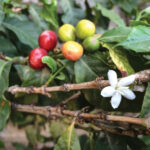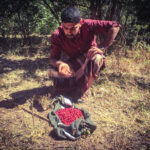[S]omething was lost in the coverage of Mokhtar Alkhanshali and Andrew Nicholson’s remarkable flight from Yemen to the historic port of Mocha, then across the Red Sea to Djibouti in a tiny boat fitted with only an outboard motor, and ultimately to the SCAA Event in Seattle. Along the way there was tank fire, airstrikes, anti-aircraft tracers, checkpoints, skittish guards, fuel shortages, a lack of infrastructure, a lack of a functioning state. Few write-ups, though, mentioned that much of this has been faced by Yemeni coffee growers for years, even decades.
The current fighting in Yemen between Houthi rebels and what might be called the government is an acute inflammation of the country’s chronic and unresolved power issues, which are now exacerbated by the proxy war between Iran and Saudi Arabia. Fortunately, the coffee farmers Alkhanshali works with through his young company, Mocha Mill, have been spared from the fighting, which has centered on the capital, Sana’a, and the port city Aden.
Alkhanshali, along with a number of others, is attempting to raise the quality of Yemeni coffee, which has long been exported to Saudi Arabia, usually at or below commodity quality. With Saudi importers willing to pay well for low-grade dried cherries, the care given to coffee is often poor. Alkhanshali, an American whose family has grown coffee in Yemen for nine generations, says that the knowledge to produce better coffee is held by older growers and even within proverbs. When he’s met with farmers, he doesn’t argue that they change to modern practices; he’s able to argue that they go back to their roots.

But the fighting has been an aggravated obstacle to getting the coffee out of the country. Spasms of violence like those over the past few months, made more common since the ouster of the country’s dictator in 2011, paired with the longstanding absence of a functioning state apparatus, helps explain practices like farmers holding dried cherries for years as a store of wealth. Many importers and roasters know how hard it can be to persuade farmers to take the risks that accompany a push for better coffee. Imagine the exponential difficulty of that case when the farmer doesn’t know which military faction will run the port at the end of harvest.



That Alkhanshali and Nicholson fled the fighting in Yemen and arrived in Seattle with not just an amazing story but incredible coffees isn’t all that’s remarkable. What is incredible is that they’re going back. They’ll keep trying to bring the oldest cultivated coffees to the latest expression of coffee culture.
—Cory Eldridge is Fresh Cup’s editor. Photos courtesy Mocha Mill.

















